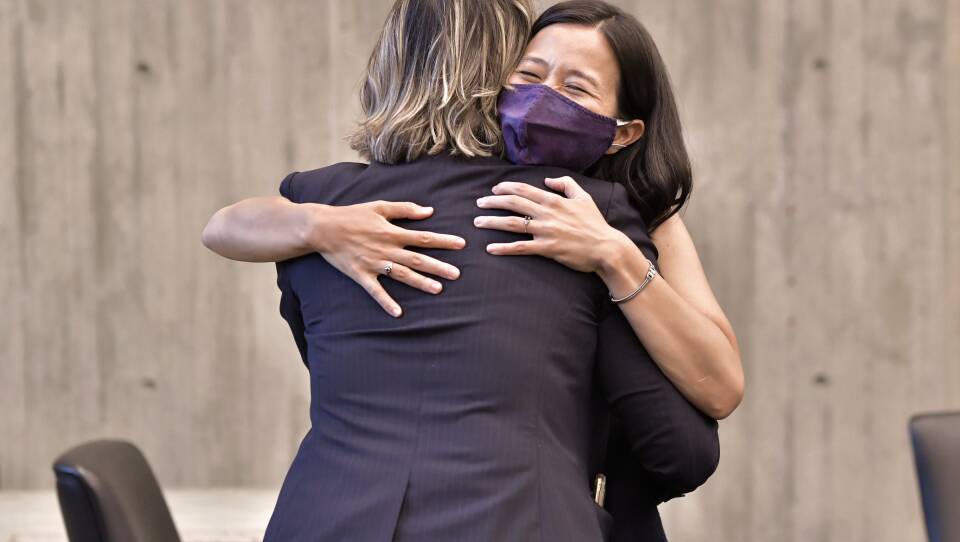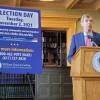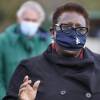Polling ahead of this week's Boston mayoral election has consistently shown Michelle Wu in the lead, but an unexpected win by Annissa Essaibi George is possible. Her campaign tells GBH News that they’re pushing hard in every neighborhood, and that they’ll have between 2,500 and 3,000 people in the field on Election Day, working to get out every vote they can. A campaign source also suggests that polling in the race might not be predictive, saying that if Essaibi George's campaign had put a lot of stock in polling, she wouldn't have survived September’s preliminary election.
For Essaibi George to win, though, the polls wouldn’t just have to be wrong, they’d have to be catastrophically incorrect. Surveys conducted in October showed Wu with 20- to 30-point leads, indicative of a bona fide landslide win when the votes are finally tallied. At this point, an Essaibi George victory would be a political case study for the ages.
While the mayoral-race outcome (whatever it is) will be top of mind for pretty much everyone watching Boston's election results, a bevy of other storylines are worth watching as well — on Tuesday and moving forward. Here are some of the biggest:
1. If Wu wins, will she get the mandate she needs? Wu has big plans for Boston: bring back rent control, make the T free, and implement a Boston Green New Deal, among other things. These systemic changes may or may not come to pass — in part because other branches of government would need to be on board — but they’ll be a lot easier to pursue if Wu becomes mayor with overwhelming support from Boston voters. If, conversely, the election is significantly closer than the polls suggest, Wu’s ability to implement her vision could take a hit.
2. What tone will Essaibi George strike on election night? The picture Essaibi George and her supporters have painted of Wu is deeply unflattering. Basically, they’ve cast Wu as a carpetbagger who’s hoodwinked Boston, Harold Hill-style , with grandiose promises that either can’t be realized or would turn the city into a socialist hellhole. (The sharpest charges haven’t come from Essaibi George herself, but from backers on social media and the super PACs supporting her campaign.) If Essaibi George loses, then urges her supporters to put the campaign behind them and give Wu a chance to govern, those suspicions and resentments would lose their edge. The same would hold true if Essaibi George wins in an upset, then strikes a conciliatory note. But if Essaibi George waxes defiant or resentful, in defeat or victory, the divisions surfaced by this campaign — between different neighborhoods, progressives and moderates, and transplants versus natives — could fester to Boston’s detriment.
3. Will the power of the white working class continue to wane? In a recent piece for GBH News, Yawu Miller, the senior editor of the Bay State Banner, noted that longstanding assumptions about the way Boston politics work have been upended in recent election cycles. The path to victory used to run through heavily white, politically moderate neighborhoods on the city’s periphery: think West Roxbury, the Neponset section of Dorchester, and South Boston. Those regions happened to be Essaibi George strongholds in the preliminary. Lately, though, fewer voters from those neighborhoods are showing up at the polls, while turnout has increased in progressive enclaves like the South End and Jamaica Plain's Pondside. If white working-class voters reverse this trend on Tuesday, it could make the election closer than anyone expects. If not, it’ll lend further credence to the idea that Boston politics have been irrevocably transformed.
4. Will Wu have ideological coattails? The mayoral race isn’t the only contest pitting an idealistic progressive against a pragmatic moderate. District 3 Councilor Frank Baker, who’s seeking a sixth term, is the spiritual heir to former councilors Jimmy Kelly and Dapper O’Neill, who catered to the aforementioned white, working-class voter base and generally came down to the right of their colleagues. Baker’s opponent, first-time candidate Stephen McBride, is a Pennsylvania transplant who cites Stacey Abrams and Elizabeth Warren as political role models. Then there’s the contest in District 6, where Kendra Hicks and Mary Tamer are vying for the seat currently held by outgoing councilor Matt O’Malley. In that race, which has grown increasingly acrimonious , Hicks falls closer to the left end of the political spectrum and Tamer more toward the center. A big Wu win could help boost both McBride’s and Hicks’ prospects.
5. Will The Ballot-Question Results Change The Way Boston Works? If Question 1 passes, it’ll fundamentally change Boston’s budgeting process by ending the structural dominance the mayor’s office has long exerted and empowering the City Council’s ability to shape what gets spent where. My colleague Peter Kadzis, who is not prone to overstatement, contends that the outcome of the Question 1 vote will matter more in the long run than the mayoral result. Question 3, which is nonbinding, asks voters whether Boston should jettison its mayorally appointed school committee for an elected one, a move Wu has endorsed with a caveat. (She’d like to retain some appointed seats to ensure the body includes experts; for her part, Essaibi George wants to shift to a school committee comprised of both mayoral and council appointees.) If Wu wins big and Question 3 passes by a wide margin, proponents of an elected committee will have the political winds at their back heading into 2022. Question 2, which asks voters for a nonbinding take on the construction of a new electrical substation in East Boston, doubles as a unofficial referendum on how aggressively Boston should shift from traditional to renewable energy sources as the city addresses climate change.
6. How patient will the Wuniverse be? As Senator Ed Markey beat back a primary challenge from then-Congressman Joe Kennedy III last year, he was buoyed by the cadre of young, passionate, web-savvy activists known as the Markeyverse. Fast forward a few months: When the Markeyverse took issue with the senator’s response to escalating Israeli-Palestinian tensions, they called him out publicly and forcefully. Many of the same young progressives who backed Markey in 2020 are supporting Wu in 2021, a dynamic Markey celebrated when he endorsed Wu's mayoral bid. If Wu wins, they’ll expect her to deliver on the commitments that drew them to her campaign. And if they start to question her tactics, her commitment or her sense of urgency, they’re unlikely to keep those doubts to themselves.
7. Will the next mayor co-opt her rivals — or freeze them out? After Marty Walsh was elected mayor in 2013, he tapped opponents John Barros and Felix Arroyo for his cabinet, effectively eliminating them as possible figures of opposition moving forward. If Wu wins, might she find a role for, say, Andrea Campbell in her administration? Tapping Essaibi George would be a much harder sell, especially given the tenor of the campaign's closing days. But if Wu asked Essaibi George to take charge of Mass and Cass, could she really refuse? (Their divide over rebuilding the Long Island Bridge notwithstanding, both women agree the situation there is untenable and that the neighborhood’s denizens deserve better treatment than they got under former Mayor Marty Walsh.) Then again, the late Tom Menino, one of Wu's political mentors, infamously made his former opponent Sam Yoon feel so unwelcome in the city that he left altogether. Given how quickly the next mayoral administration will have to start governing, we’ll quickly get a sense of which approach Wu prefers. Ditto Essaibi George, if she pulls off a stunner.







